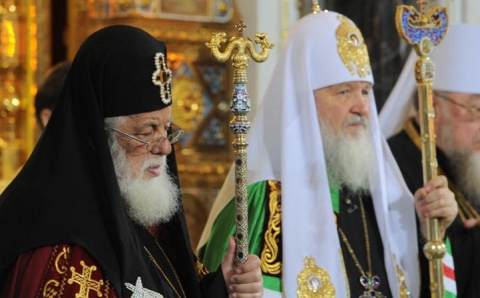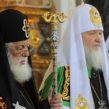
Russia’s Soft Power in Georgia: How Does It Work?
Publication: Eurasia Daily Monitor Volume: 13 Issue: 34
By:

In this year’s State of the State address, Georgian President Giorgi Margvelashvili warned about the increasing influence of Russian “soft power” on his country (Ghn.ge, February 3). Moreover, the United States Intelligence Community’s 2016 Worldwide Threat Assessment report named “effective Russian propaganda” as one of the most likely causes that could force Georgia to suspend its efforts for Euro-Atlantic integration (Dni.gov, February 9).
However, what exactly is Russian soft power? And how does it work in Georgia? To answer these questions, Georgia’s self-styled liberals, mainly consisting of certain domestic non-governmental organizations (NGO) and a portion of the Georgian academic community, often point to the powerful Georgian Orthodox Church (GOC). Indeed, some of the GOC’s high-ranking hierarchs, as well as its lower-level clergy, have repeatedly denounced what they call the “moral decadence” of the West. Moreover, they have advocated closer ties with Orthodox Christian Russia in order to pursue what they perceive as shared spiritual and cultural values (Geworld.ge, November 27, 2013; December 18, 2013; November 19, 2014; June 17, 2015).
The Georgian Orthodox Church’s much revered head, Catholicos-Patriarch Ilia II, has traveled to Russia even during the height of Russian-Georgian tensions. In 2008, he attended the funeral of the late Patriarch of all Russia Alexei II. Furthermore, in 2013, he visited Moscow again, meeting with Russian President Vladimir Putin. On both occasions, Ilia II emphasized the need to normalize relations with Russia (Interpressnews.ge, December 12, 2008; Civil Georgia, December 10, 2008; December 12, 2008; January 23, 2013). Some in Georgia took this visit as an unmistakable sign that the GOC was collaborating with the enemy even in the most difficult times for the country (Tabula.ge, January 24, 2015).
The GOC has tried to dispel such allegations. Patriarch Ilia II demonstratively declared on several occasions that the Church fully supports Georgia’s Euro-Atlantic integration and that Georgia’s place was in Europe (Patriarchate TV, March 24, 2015; 1tv.ge, December 20, 2015). Moreover, he regularly stresses that Russia’s ongoing occupation of Abkhazia and the Tskhinvali region (South Ossetia) remains the main obstacle to the normalization of Russian-Georgian ties (Radio Atinati, July 31, 2013). Nonetheless, not everyone seems convinced (24saati.ge, July 17, 2013).
What those Georgian liberals preoccupied with the GOC miss, however, is the highly elaborate and complex Russian propaganda machine simultaneously operating in the country. Among its main weapons are Russian TV channels that are freely available nationwide in Georgia. These TV channels, which are entirely controlled by the Kremlin, broadcast to millions of Georgians not only Russian movies and culture, but also news propaganda that can distort and neutralize any impartial news coverage, whether Georgian or Western. Notably, during the August 2008 Russian-Georgian war, the Georgian government shut down Russian television broadcasting. But in 2014, Russian TV channels returned to Georgian airwaves (Netgazeti.ge, July 22, 2014). Shutting them down again would require political will and resoluteness that the current Georgian government does not seem to possess—especially against the background of the ongoing Russian-Georgian rapprochement.
The Kremlin also seems determined to influence Georgian cyberspace. In the last several years, distinctly anti-Western and pro-Russian Internet media sources, such as for instance Geworld.com, Saqinform.ge and Sputnik-georgia.com, have proliferated. Moreover, in November 2014, Moscow launched the radio station Sputnik, which broadcasts in Russian and Georgian languages and has an inconspicuous representative office right in downtown Tbilisi (Geonews.ge, November 12, 2014).
Furthermore, Moscow tries to counterbalance Georgian non-governmental organizations, which receive their financial resources from the West. In recent years, pro-Russian NGOs became increasingly active. Together, many of these Moscow-sponsored groups have founded a large coalition, “Eurasian Choice—Georgia,” which actively promotes the Kremlin’s foremost regional integrationist project, the Eurasian Economic Union, and advocates Georgia’s membership in it. In addition, the coalition is establishing various scholarly and youth organizations, such as for instance, “The Club of Young Political Scientists” or the “Public Movement for Russian-Georgian Dialogue and Cooperation,” in order to attract the wider public (Media.ge, October 6, 2015).
Using all these venues at its disposal, Russia’s soft power skillfully feeds off Georgian cultural sensitivities and the utter weakness of Georgian civil society and its political elites. Georgia is a country with an overwhelmingly Christian Orthodox population that has deeply entrenched conservative values and culture. Russia positions itself as a defender of those conservative values, which strikes a chord with large swathes of Georgian society.
One of those most controversial issues domestically is the question of gay rights, a hard topic for this conservative society. “I want Georgia to become a member of NATO [the North Atlantic Treaty Organization] and the European Union, and I want to think that our traditional Georgian values are compatible with our membership there. But if they [the West] force us to accept same-sex marriage and that whole propaganda as a way of life, then we have nothing to do in there. I want NATO and European membership in order for Georgia and its values to survive, not to perish” Giorgi Darakhvelidze, a 21-year-old student from Tbilisi, told this author (Author’s interview, February 12).
It is paradoxical for Russia, an imperial power that spent many decades and huge resources on assimilatory policies in occupied Georgia during the 19th and 20th centuries, to now pose as some kind of defender of Georgian national culture and values. And yet, pro-Russian groups in Georgia regularly hold conferences and events dedicated to studying and celebrating Georgian culture and deepening bilateral ties (Author’s interviews, February 12–13; Netgazeti.ge, March 3, 2014; 1tv.ge, April 24, 2015; News.ge, May 31, 2015).
Georgian civil society and the country’s intellectual and political elites seem detached from the Georgian public. “Georgia’s so-called pro-Western NGOs, as well as the political parties in power and in the opposition, do not seem to know or care what we, ordinary people, believe or want. All they care about is getting grants [and] Western money. They are snobbish and isolated, and I am not really sure why I should care about whatever they preach to us… I know they are doing it for money anyway,” Archil Diasamidze, an artist from the city of Batumi, tellingly asserted in an interview with this author, on February 13.
Overall, it can no longer be denied that the Kremlin is waging a successful pro-Russian informational campaign in Georgia. At this stage, it is still difficult to say whether or not Russia’s soft power is winning the day, but it is almost certainly growing stronger. It remains to be seen how Georgian elites will counteract Moscow’s efforts. They have not yet shown the necessary zeal and creativity to do so.




